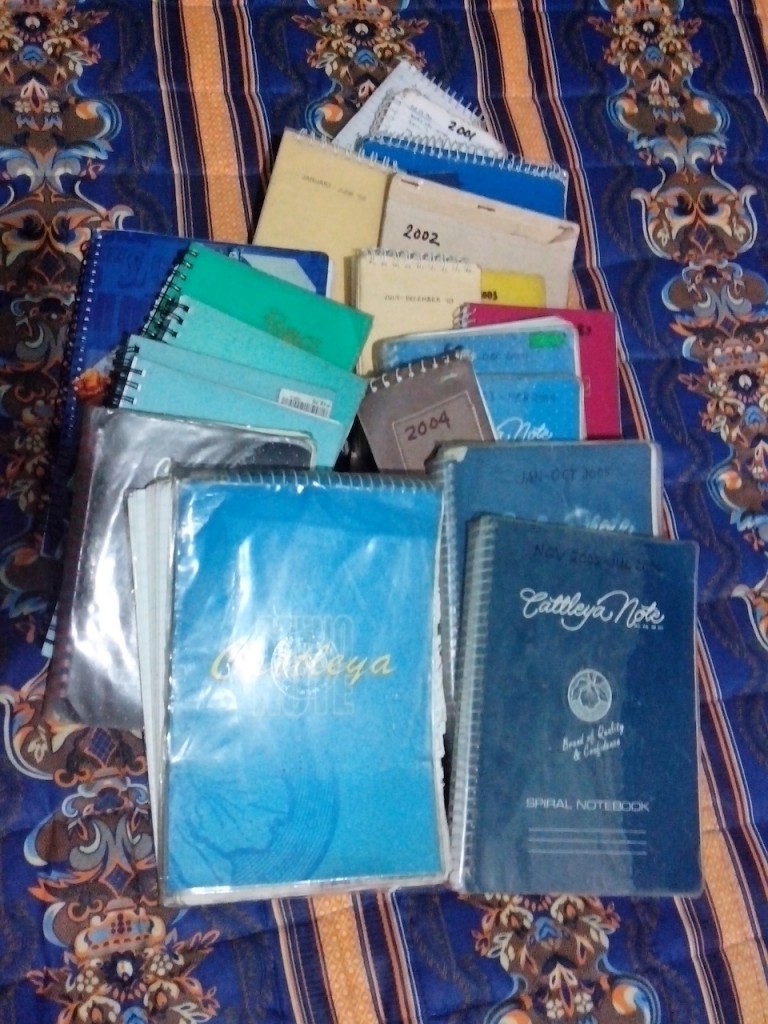When bloggers strain to write “something, anything,” we often presume they’re doing so for money or fame and viral glory. But no, it’s not that simple. Writers continuously chase their muse, as mountaineers climb their summit “because it’s there.” Sometimes they succeed, sometimes not.
Before blogging was invented, every aspiring writer’s journal—and wastebasket—was their private domain. Now blogs and email groups and Facebook posts are in the public realm, where one’s trash is another’s gem. You never can tell what diamonds you might find amid the muck.

In college, a respected literature teacher shared a tip with her circle of favorite students and friends, to which I belonged. “If you aspire to succeed as a writer,” she said—and she wasn’t referring to fiction writers only—“the most basic thing you do is to keep a daily journal.” And by God, “make sure you do write a daily entry, even if it’s just one paragraph,” she said emphatically with her gentle smiling voice.
“Force yourself to write that one paragraph,” she said. Cajole yourself, bribe yourself, stroke yourself, chide yourself, quarrel with yourself, do anything to drive yourself. Even refuse to do anything else until you write that daily paragraph. Nine times out of ten, what you write will feel yucky, something a bulimic just threw up. But that 1/10th worth saving means the other 9/10ths have played their role. Flowers grow on dirt.
Throughout these long years, I tried to follow my teacher’s advice. But I kept skipping, sometimes going through entire weeks with no new journal entries, although I was writing other political stuff most of that time. There were times—usually on cheerful January days such as this one, full of New Year’s promises—when I was absolutely convinced that my journal’s physical format was the problem. So I kept changing notebooks. At other times, I kept changing my writing pen. Or I would try changing the time of day for writing, and so on.
Thus steadily failed my many attempts to fill up artsy-fartsy hardbound volumes with solid journal entries. That is, until I saw the film Finding Forrester (2000), about an aspiring young black writer living in the ‘hood, with his rucksack full of journal notebooks. He was writing like he was breathing.
I also remembered Che Guevarra’s Motorcycle Diaries. What could be more inspiring than to travel the way he did, and fill up a diary with daily entries as he went along. For me, the best scene was when Che confided to Silvia, a leper patient in deep despair, that he was asthmatic but decided to become a doctor so he could be of some use to other people. He told her, almost in a screaming whisper: “Silvia, you have to fight for every breath, and tell Death to go to Hell.” Che had continued his diary habit practically until Death stared him in the face.
Then it hit me: Writing is breathing, and writers have to fight for every line as though they were fighting for every breath. I should commit myself to write daily, even if I got chained to a cot for five years in an unlighted prison cell, with no access to pencil and paper, and with only my mind’s eye tracing words of defiance on the ceiling. All of us, after all, have to break out of prison cells inside our minds as well as in real life.
Writing is breathing, and we have to fight for every breath. Fight for every breath, like Che advised, even if we have to tell Death to go to Hell.#Follow @junverzola

